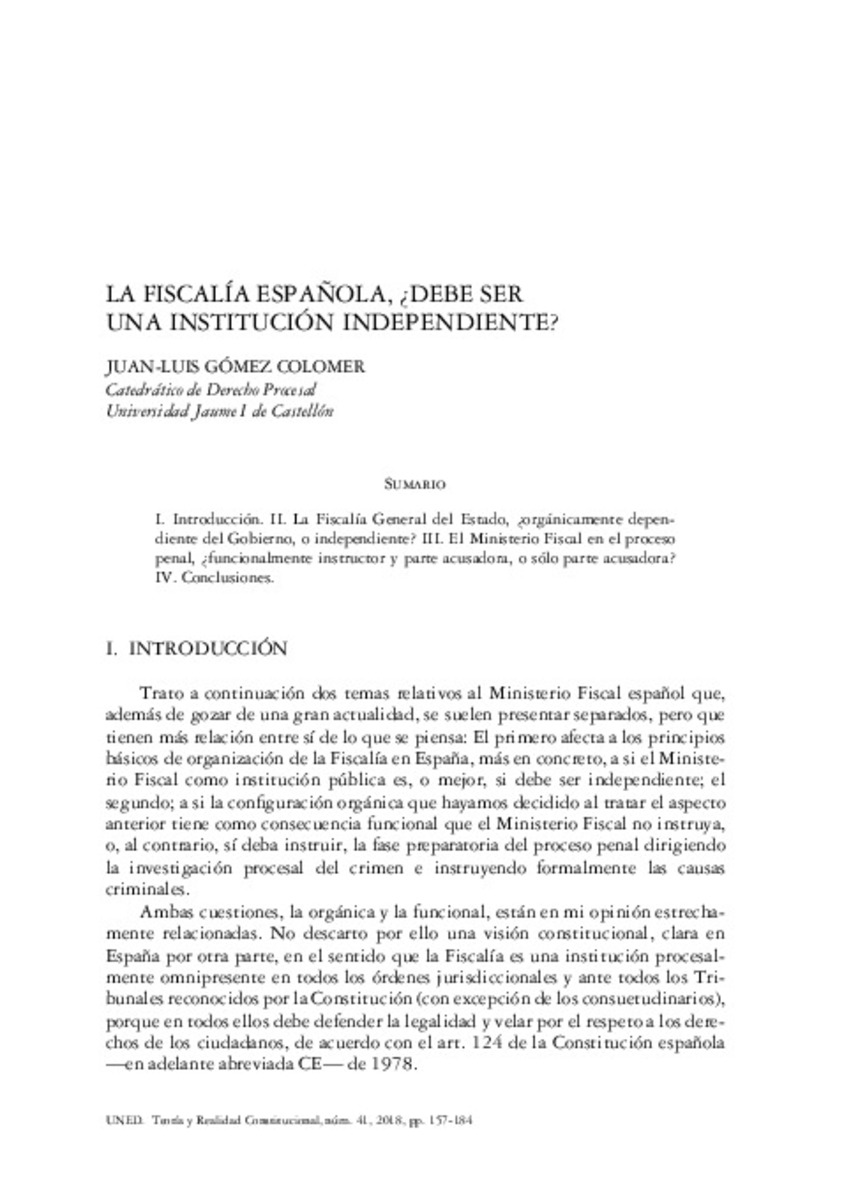Mostrar el registro sencillo del ítem
La Fiscalía española ¿Debe ser una institución independiente?
| dc.contributor.author | Gómez Colomer, Juan-Luis | |
| dc.date.accessioned | 2018-06-11T18:42:18Z | |
| dc.date.available | 2018-06-11T18:42:18Z | |
| dc.date.issued | 2018 | |
| dc.identifier.citation | GÓMEZ COLOMER, Juan Luis. La Fiscalía española. ¿Debe ser una institución independiente?. Teoría y Realidad Constitucional, 2018, núm. 41, p.157-184 | ca_CA |
| dc.identifier.issn | 1139-5583 | |
| dc.identifier.issn | 2174-8950 | |
| dc.identifier.uri | http://hdl.handle.net/10234/175100 | |
| dc.description.abstract | El Ministerio Fiscal español tiene ante todo un problema de identidad orgánica. Se desea que sea independiente del Gobierno, pero las normas confirman una cierta dependencia. El Ministerio Fiscal debe ser dependiente del Gobierno si se consuma la reforma hacia un modelo adversarial de enjuiciamiento criminal, porque ésa es la naturaleza que mejor cuadra con dicho sistema, en donde el acusado sabe que enfrente tiene a la Administración, que, cumpliendo con su deber público, le exige con todo su poder responsabilidad por sus actos. Hasta que se produzca el cambio, es mejor dejar las cosas como están. El Ministerio Fiscal no debe instruir el proceso penal ni dirigir la investigación del crimen mientras no tengamos el antedicho sistema adversarial vigente en España. Sería constitucional si lo hiciera, pero no está probado que esté preparado para hacerlo, y probablemente, a pesar de declaraciones oficiales, no desee asumir ahora esa responsabilidad. Con las normas y la práctica actual, correría el peligro de ser visualizado en los casos más importantes como un órgano no objetivo. | ca_CA |
| dc.description.abstract | The Spanish Public Prosecution Service has, foremost, a problem of organic identity. It is believed that it should be independent from the Government, but the laws confirm some degree of dependence. The Public Prosecution should depend on the Government if the reform toward an adversarial model of criminal procedure is pursued, because that is the nature that best fits a system in which the defendant knows he is facing an Administration that, fulfilling its public duty, is demanding with all its powers that he takes responsibility for his actions. Until the change is produced, it is better to leave things as they are. The Public Prosecution Service should not direct the criminal investigation while the foresaid adversarial system in not in force in Spain. If it did, it would be constitutional, but it has not been demonstrated that it is ready to do so and, probably, in spite of official declarations, the Public Prosecution does not want now to assume that responsibility. With the current laws and practices, the Prosecution Service would be in danger of being taken as a non-objective organ in the most important cases. | ca_CA |
| dc.format.extent | 28 p. | ca_CA |
| dc.format.mimetype | application/pdf | ca_CA |
| dc.language.iso | spa | ca_CA |
| dc.publisher | Universidad Nacional de Educación a Distancia (España). Facultad de Derecho | ca_CA |
| dc.relation.isPartOf | Teoría y Realidad Constitucional, 2018, núm. 41, p.157-184 | ca_CA |
| dc.rights.uri | http://rightsstatements.org/vocab/CNE/1.0/ | * |
| dc.subject | Ministerio Fiscal | ca_CA |
| dc.subject | relación con el Gobierno | ca_CA |
| dc.subject | proceso penal | ca_CA |
| dc.subject | órgano instructor | ca_CA |
| dc.subject | dirección de la investigación del crimen | ca_CA |
| dc.subject | Public Prosecution Service | ca_CA |
| dc.subject | relationship with the Government | ca_CA |
| dc.subject | criminal procedure | ca_CA |
| dc.subject | criminal investigation director | ca_CA |
| dc.title | La Fiscalía española ¿Debe ser una institución independiente? | ca_CA |
| dc.title.alternative | The spanish public prosecution service: should it be an independent institution? | ca_CA |
| dc.type | info:eu-repo/semantics/article | ca_CA |
| dc.rights.accessRights | info:eu-repo/semantics/openAccess | ca_CA |
| dc.relation.publisherVersion | Teoría y Realidad Constitucional, 2018, núm. 41, p.157-184 | ca_CA |
| dc.type.version | info:eu-repo/semantics/publishedVersion | ca_CA |
Ficheros en el ítem
Este ítem aparece en la(s) siguiente(s) colección(ones)
-
DPU_Articles [387]







